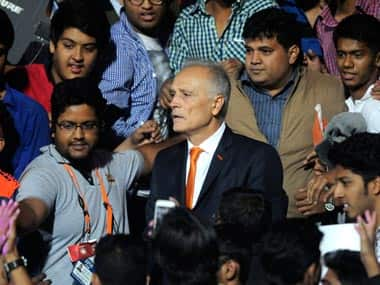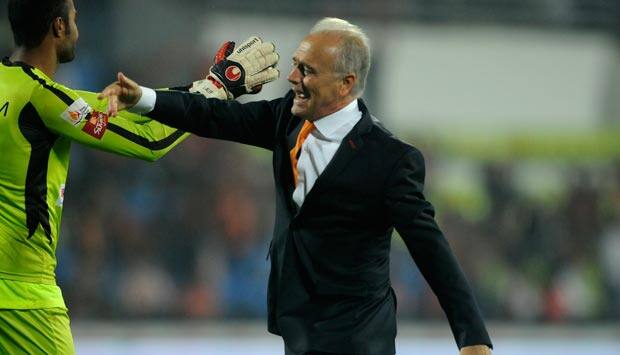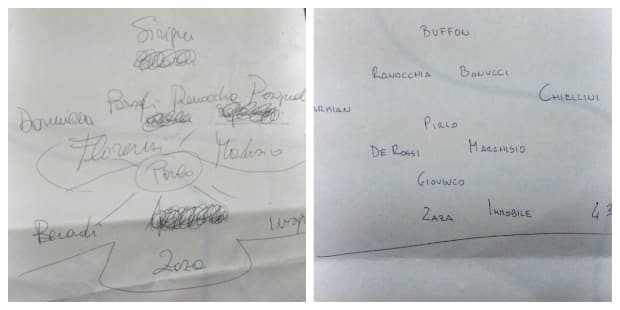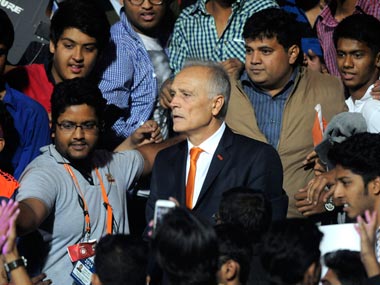Franco Colomba runs across the pitch — leaving his technical area — connecting with a wild leap and a hi-five with his surprised goalkeeper. Then he stoops down, collects his reading glasses that fell off, and sees the goal he was celebrating ruled out for offside. Colomba does it again after the next goal and gets sent off — for the second time in the space of a dozen games in the Indian Super League. The FC Pune City manager’s pitch-side tantrums are brilliant to watch — you can see him scream ‘caz*o’ again and again — the word for ‘f*ck’ in Italian. His demeanour changes in the space of a few minutes, from calm and composed wise white-haired man to joker at the press conferences and to angry and animated during a match. Colomba has left 18 jobs in his managerial career but has played for just four clubs in his playing days. In 40 years in the game, he has scored goals which promoted his team, saved teams from relegation as a coach and refused a job at AS Roma in the year they won the title because he wanted to stay in Bologna, where his heart was. [caption id=“attachment_1842363” align=“alignleft” width=“380”]  Franco amid fans after being sent off. ISL[/caption] He refuses to admit racism is a problem in Italian society. In short, he is a delightful oxymoron, an eccentric genius, a coach who can’t stop playing the game at training and takes that attitude to match-day. He believes in holding back as manager, but describes himself as ‘hyper-active’. He is a character who entertains and bewilders at the same time. But he is also a very gentle father — of midfielder Davide Colomba — a son who becomes his player for three hours every day. Colomba’s FC Pune City have played a dominating, firebrand style of football — but failed to finish in the top four of the Indian Super League. However, the Italian has had his moments in the tournament. In an exclusive chat with Firstpost — Franco and Davide Colomba bare all — from adventures in Italy to the challenge of playing for kin — from regrets to successes and failures — to the future and what was. Franco - the democratic dictator ‘Colomba volare! Colomba volare! Colomba volare!’ the fans of Bologna and Avellino would scream every time Franco Colomba received the ball on the inside left. “It means fly Colomba - colomba means dove in Italian,” the 59-year-old explains. Between 1973 to 1988, he played 162 league games for Bologna and 132 for Avellino. It was hard to get games in those days in Italy — top players like Michel Platini, Zico and Diego Maradona were all playing there. [caption id=“attachment_1842365” align=“alignleft” width=“620”]  Franco Colomba celebrates with his keeper. ISL[/caption] Still, Colomba managed to win the hearts of his two major clubs. Colomba scored the goal which kept Avellino in the Serie A. Already a hero after netting against Roma and Lazio that season – the Avellino supporters couldn’t control themselves when, after the relegation escape, they saw their skipper stopped at a traffic jam. They pulled him out of the car and started throwing him into the air. “There were 10 buses full of fans and I had to party with them on the road for three hours. Poof! Poof! Poof! They threw me like that,” Colomba says, making gestures with his hands — the Italian contingent surrounding him started smiling — this was their manager being himself. “I’m satisfied with my career. I always wore No 10 or 11. But every day is a new challenge. I look back with pride at my past – but I look forward to the future.” But Colomba’s managerial career has hardly been as stable as his playing. He has been fired by many clubs, including his beloved Bologna, within months — even weeks in a couple of instances. There have been firings and immediate recalls. There have been situations where he saved clubs (Parma included) and won promotions, but his contract was not extended. There has been trouble with owners and disagreements have led to abrupt sackings. Colomba says it was not his fault. “It’s not a culture in Italy to keep managers. It is too ruthless. And there are cases where I think people were unfair to me and I do harbour some anger. But I won’t name any club,” he said — adding that his only regret is not taking the AS Roma job. “They won the Serie A that season – so it was a bad decision professionally but a good one for the heart,” adds the pasta-and-wine loving Italian. But he is hardly stereotypical when it comes to football. Colomba knows the importance of defence but doesn’t support ‘catenaccio’. His team builds up play slowly before launching through speed down the wings — an area, which as a trainer, Colomba believes is his best attribute. We asked him his Italy XI and he scribbled, in very ineligible handwriting, a team which he said was 4-3-3 or 4-2-3-1. The best player he ever managed was Andrea Pirlo — and he doesn’t even wait for this question to finish before blurting out the great midfielder’s name. Colomba also has his favourites. “I gave Bruno (Cirillo) a debut when Reggina were going to sell him to a lowly club. After that match, Inter came and bought him. With (Emanuele) Belardi, I gave him a go and he saved an Andriy Shevchenko penalty on debut.” Both Cirillo and Belardi came to Pune with Colomba. But what about the handling of the team? “I like to make conversation. I like talking to players and my staff. I listen to everyone. But I am a…” he trails of looking for the word, before asking: “You know Mussolini? What do you call him in English?” Dictator? “Yes, but I am a democratic dictator. I listen, but I decide." And this includes his son’s career also. Franco and Davide – father and son, player and manager “When people tell me something and I know they’re talking sh*t, I get very angry. That, and long interviews,” Franco tells us — moments after how revealing his admiration for Carlo Ancelotti’s calm and composed manegerial methods. Barely a day later we ask his son Davide Colomba what sort of person his father is. “Too gentle at times for me,” says Davide — maybe the 26-year-old tricky left-midfielder can’t see past sentiment — his father’s managerial characteristics can be hard to digest. It is just the first of many differences in outlook the two have, despite some alarming similarities. Franco and Davide play in the same position. Both are left-footed and think alike on the football pitch — roam the inside left, try and play your man in with a cross. But there are differences too: “I am less technical but more physical. I’m stronger – but we want the same things. Agendas are the same but ways are different. My strong point is shooting and weakness is speed. But if I am positive in a moment, I can beat my man easily,” Davide says. Franco is however, unforgiving in selection: “I can see Davide is playing well, so I put him on the pitch. But you’ve seen me take him off too. He is my player while training and during the match — and son, off the pitch. This shift needs to be made, or else it is very hard. Very few know, but even the Maldinis (Cesare and Paolo) faced a lot of trouble.” [caption id=“attachment_1842361” align=“alignleft” width=“620”]  Franco (L) and Davide’s (R) Italy XIs.[/caption] “In Italy, the surname can be a stone on your shoulder. And I think Davide hasn’t had as much success in his career as he deserves. I hope in the future he can get what he hasn’t. He has showed he can play, but there were issues with Parma (ownership). My name doesn’t help him,” he adds. Davide, after some coaxing, admits to the difficulties: “Sometimes I feel I have to give more when I’m in the playing XI, compared to the effort under other managers. It’s hard, yes, but if you’re thinking we argue about a starting position, then no we don’t. Off the pitch, he’s my father and this has been a great chance to know him more — as a coach and manager.” Franco is also thankful for a chance to manage his son. But what about Mrs Colomba? “No, no, she doesn’t interfere,” says Davide. “When the family meets, and we meet every week or two, football is a topic that me and my dad discuss. But my sister and my mother get involved in if it’s important.” Franco’s father was in the carabinieri (the national military police of Italy) and wanted him to be a lawyer, but Franco simply says ‘people told him I was good only at football’ — so he let him play. “But let me tell you,” he breaks off from the story of his childhood days — “I have two (children). One, a footballer, and I’m happy. The other, my daughter, is a lawyer — so she is fulfilling my padre’s wish.” The question is whether Davide would follow in his father’s footsteps — his tactical outlook is still nascent — like that of a young footballer, relying on intangibles like character and desire. “You need heart to play football. Not positional sense,” he says, in complete contrast to his father’s belief that a player has to be used in his best position. Davide’s Italy XI is also very different from his father’s. Both don’t choose Mario Balotelli — and only five players are similar picks. Franco and Davide are two very similar and yet different people — they see football in a different light while sharing the same passion. It’s a unique insight into an unknown world where relationships overlap. And so do ambitions. Davide’s next mission, he says, is to find a club in Italy. But he is also open to moving abroad. As for Franco, he will take the next job — as he has always. He admits he would also take options to be an assistant to a manager at a top club — but until that happens, he’ll probably go back to his favourite hobby — sailing. After all, it’s been a long adventure in India which could have ended with a semifinal had his team scored one of their 16 shots on target against Kerala Blasters in the final league match. The writer tweets @TheFalseNo9
Colomba’s FC Pune City have played a dominating, firebrand style of football — but failed to finish in the top four of the Indian Super League. However, the Italian has had his moments in the tournament.
Advertisement
End of Article
Written by Pulasta Dhar
If there is one place Pulasta Dhar wanted to live, it would be next to the microphone. He writes about, plays and breathes football. With stints at BBC, Hallam FM, iSport, Radio Mirchi, The Post and having seen the World Cup in South Africa, the Manchester United fan and coffee addict is a Mass Media graduate and has completed his MA in Broadcast Journalism from the University of Sheffield." see more


)

)
)
)
)
)
)
)
)



